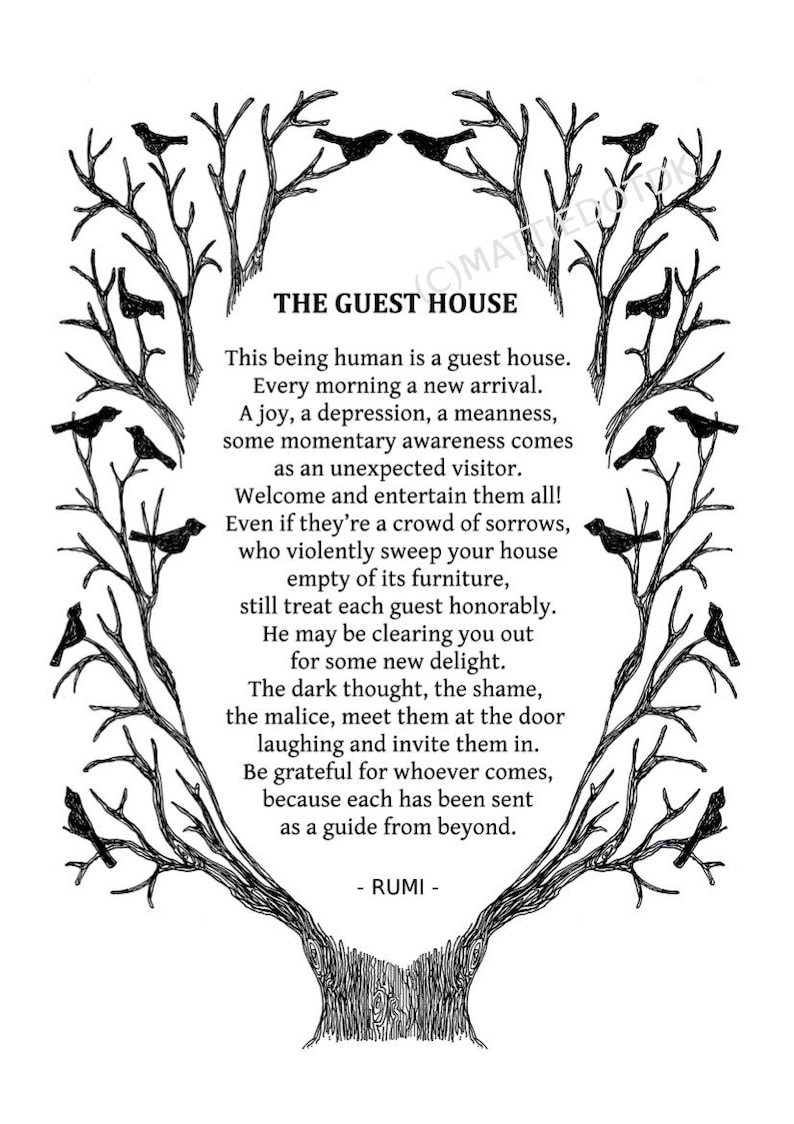Table Of Content

Rumi’s teachings urge us to embrace the present moment, recognizing the transient nature of our experiences. This perspective allows us to face challenges with resilience, knowing that they too shall pass, leaving us stronger in their wake. As I said in my article on this topic, acceptance is not about the exterior, but about the interior.

Promoted Poems
This metaphor helps readers understand the importance of observing and learning from each experience without becoming overly attached. Rumi’s “The Guest House” is a timeless reminder to embrace every aspect of our journey. For the modern woman, it’s a call to live authentically, to welcome life’s myriad experiences with open arms, and to find strength in the ebb and flow of emotions. In doing so, we not only enrich our own lives but also set a powerful example for those around us.
.st1display:noneLatest posts
When we first start meditation, we have a hard time just concentrating. We do do not see the thoughts and emotions that arise in the way described by Rumi. This being human is a guest house.Every morning a new arrival. Life’s challenges, much like these old chestnuts, are timeless teachers. As we revisit these challenges at different seasons of life, they reveal new layers of meaning and insight, helping us to grow and evolve in unexpected ways.
ABOUT ON YOUR JOURNEY

This being human is a guest house.Every morning a new arrival.A joy, a depression, a meanness,some momentary awareness comesAs an unexpected visitor.Welcome and entertain them all! Rumi uses the metaphor of a guest house to illustrate the transient nature of emotions and experiences. Just as guests come and go, so do feelings and thoughts in the human mind.
It is with happy hearts that we celebrate and share the value of poetry by offering you an opportunity to receive a poem each month in your inbox. Even if they’re a crowd of sorrows, who violently sweep your house empty of its furniture, still, treat each guest honorably. We're Luciana and Anna - best friends, mums, and the souls behind this blog. We share a passion for spirituality, empowerment, and wellness, stemming from our diverse life experiences.
In 1224 Rumi married Gauhar Khatun, with whom he had two sons. In 1229, his father was invited the by sultan of Seljuk Turks to teach theology in the capital, Konya. Rumi was raised to be a scholar and teacher; after being sent to Aleppo and Damascus to finish his religious training, Rumi took over his father’s post. In the context of Rumi’s Guest House, each visitor – or emotion – we encounter can be seen as a potential teacher.
The poem teaches acceptance
Within this Sufi poem, we find a treasure trove of wisdom that transcends time and culture. His words speak directly to the soul, reminding us that every experience, no matter how seemingly insignificant, holds a kernel of wisdom and should be acknowledged and felt. Every seen unpleasant emotion and thought that is met with openness brings us its small dose of happiness. When you reach even further on the path of meditation, you start to acknowledge that all the emotions that come up, appear for a reason.
By bravely facing these challenging emotions, we learn resilience and find new depths of courage within ourselves. As women, we often feel the pressure to maintain composure, to be the rock for others. But Rumi tells us to embrace every emotion, be it joy, depression, or meanness. It teaches us to be more compassionate with ourselves and others, as we recognize that everyone has their own set of challenging guests.
Similar Posts
Hiatus looks beyond human behaviour on the atmospheric "Arrival" - The Line of Best Fit
Hiatus looks beyond human behaviour on the atmospheric "Arrival".
Posted: Thu, 12 Nov 2020 08:00:00 GMT [source]
Even if they are a crowd of sorrows,who violently sweep your houseempty of its furniture,still, treat each guest honorably.He may be clearing you outfor some new delight. The central theme of “The Guest House” is the acceptance of all emotions and experiences as integral parts of life. Rumi teaches that each visitor, or emotion, carries a message or lesson, and thus should be welcomed with equal honor and respect. The difficult moments are often where we find our strength and resilience. Embracing life’s ups and downs, as Rumi suggests, leads us to a deeper understanding of ourselves and our journey. This approach to emotional management is not just poetic; it’s practical and healing.
Just as a guest house sees all kinds of visitors, our lives are enriched by diverse experiences and people. This diversity adds color and depth to our existence, teaching us invaluable lessons about the world and our place in it. Some are pleasant, others not so much, but each one carries a unique lesson or opportunity. In our lives, these guests could be joy, sorrow, meandering thoughts, or sudden events. Even if they’re a crowd of sorrows,who violently sweep your houseempty of its furniture,still, treat each guest honorably.He may be clearing you outfor some new delight.
How does Rumi’s background as a Sufi mystic influence the poem? Rumi’s Sufi background is evident in the poem’s embrace of transience, emotional depth, and the notion of divine orchestration behind life’s events. His teachings often focus on the inner spiritual journey, which is mirrored in how the poem encourages embracing all facets of human experience as a pathway to spiritual enlightenment.
Yes, “The Guest House” can be considered a guide to mental health, as it promotes a healthy way to cope with various emotions. By advising readers to welcome all emotions without judgment, Rumi encourages a mindful and accepting approach to mental well-being. “The Guest House” is no exception, providing readers with a guide on how to embrace every aspect of life. This wisdom guides us to live a life well-lived, marked by resilience, growth, and a deep sense of fulfillment. Like house guests, some stay briefly, while others linger, but each one offers a unique lesson. By greeting them with kindness and curiosity, we practice self-compassion, learning to extend the same understanding and patience to ourselves that we would offer a respected guest.
Furthermore, we often have the impression that they are quite permanent. Sufi mystic Jalal al-Din Rumi was born Jalal al-Din Mohammad-e Balkhi on the edge of the Persian Empire, in Balkh in modern-day Afghanistan (though another birthplace in Tajikistan is also claimed). The son of Baha’ al-Din-e Valad, a noted scholar and theologian, Rumi’s family fled the Mongols, settling in Samarkand and then Anatolia.
Rather, it means we acknowledge their presence, listen to what they are trying to tell us, and let them pass through our ‘house’ in their own time. His timeless poem, “The Guest House,” serves as a powerful metaphor for embracing every facet of our human experience. But because of the implication of a real guest house and real people, I found it hard to accept the message that was made explicit to us by the meditation teacher. In mindfulness courses all around the world, the poem ‘The guest house’ Rumi is read. The poem reminds us to not resist our thoughts and feelings, but on the contrary, to welcome them as if they were noble guests that we were eager to see. Can “The Guest House” be considered a guide to mental health?


No comments:
Post a Comment